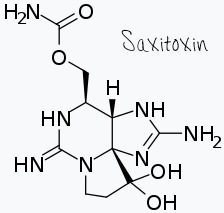There has been a spate of dog deaths on UK beaches, particularly around the coasts of Norfolk and Suffolk where pets have eaten starfish and other sea creatures washed up on shores in stormy weather.
The cause of death has been pinned down to paralytic shellfish toxins, although as the BBC reports algal blooms are uncommon in winter so the source of the contamination is not known. These toxins are entirely natural compounds, but neurotoxins nevertheless. They are made by certain types of algae, which are then assimilated by shellfish and other sea creatures further up the food chain, rendering otherwise edible animals toxic and potentially lethal. The toxins can cause a very unpleasant death for mammals, including people, in some cases. Indeed, it’s worth noting that these toxins are not destroyed by heat or acids, so cooking contaminated shellfish doesn’t get rid of them.
Among the toxins, perhaps the best known is saxitoxin, the biosynthesis of which I wrote about in 2017 for Chemistry Views magazine. The compound has the following quite hefty chemical name, the structure of saxitoxin is shown at the bottom of this article:
(3aS-(3a-α,4-α,10aR*))-2,6-Diamino-4-(((amino-carbonyl)oxy)methyl)-3a,4,8,9-tetrahydro-1H,10H-pyrrolo(1,2-c)purine-10,10-diol
Anyway, if you’re walking your dog on the beach, make sure they don’t eat anything in the tideline or indeed anything at all washed up or otherwise lying on the shore, you never know what toxic nasties it might contain.
